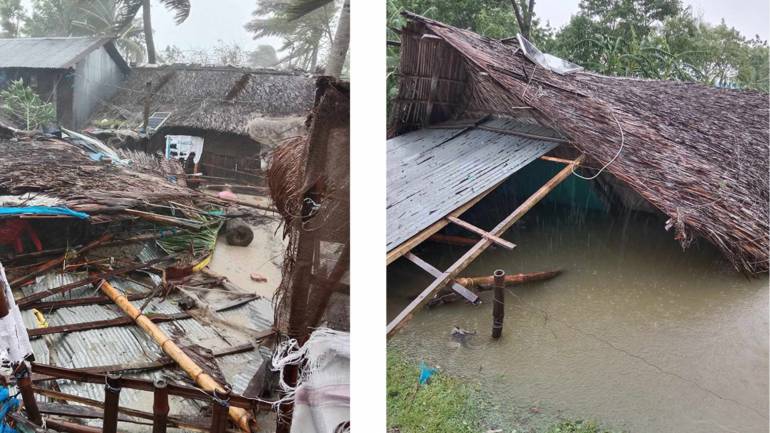Cyclone Remal Devastates Bangladesh: Lives Lost, Homes Destroyed

On May 26, Cyclone Remal wreaked havoc in Bangladesh, leaving a trail of destruction in its wake.
At least 16 fatalities were reported across 19 districts, more than 173,000 homes were destroyed, and over 3.7 million people were seriously impacted.
The cyclone made landfall near Khepupara in Patuakhali with fierce wind speeds of up to 130 km/h on Sunday evening. However, it didn’t stop there. A deep depression transformed Remal, continuing its menacing journey northeastward.
The most affected districts are Khulna, Satkhira, Bagerhat, Jhalakathi, Barishal, Patuakhali, Pirojpur, Barguna, Bhola, Feni, Cox's Bazar, Chattogram, Noakhali, Lakshmipur, Chandpur, Narail, Gopalganj, Jashore, and Shariatpur.
The cyclone left behind a trail of destruction that breached embankments, inundated neighborhoods, and uprooted trees in 19 coastal districts of Barishal, Khulna, and Chattogram divisions.
Around 2.7 crore people were without power in the Barishal and Khulna divisions, which caused around 15,000 cell towers to go offline.
It destroyed crops, vegetables, and fruits, according to concerned officials, and damaged fish farms. In three districts alone, Remal destroyed fish worth Tk 482 crore.
In response to this disaster, Bangladesh’s state minister for disaster management and relief, Mohibbur Rahman, took swift action. He announced the creation of nearly 8,000 cyclone shelters to provide refuge for those displaced by the storm. Additionally, he mobilized close to 80,000 volunteers to assist the affected population, providing much-needed support during this challenging time.
Caritas Khulna Regional Director (Acting), Albino Nath, described the dire situation: "Families are mourning the loss of loved ones while struggling to find shelter and basic necessities. The destruction of homes and infrastructure has left many without a roof over their heads or a means to communicate with the outside world. Our farmers and fishermen, who form the backbone of our local economy, have lost their means of livelihood, plunging them into uncertainty and despair."
Robi Halder, a resident of one of the affected villages, recounted the devastation: "All houses in our village are under saline water as the storm surges breached the embankment along the Dhaki river. The storm surges inundated five villages in the Union. More than a hundred families are now on the embankment." He added that the ongoing rain had caused severe waterlogging, further disrupting daily life.
Major parts of the southern districts were without power for more than 36 hours. According to the Bangladesh Rural Electrification Board (BREB), 2.70 million people had no power.
The prolonged outage took out over 15,000 mobile phone towers (base transceiver stations), disrupting mobile and internet services.
As relief efforts continue, the focus remains on providing immediate assistance to the displaced and restoring essential services. The government and various organizations are working tirelessly to rebuild and support the affected communities, but the road to recovery will be long and challenging.
The effects of Cyclone Remal serve as a stark reminder of coastal communities' vulnerability and the importance of disaster preparedness and relief efforts. Our thoughts are with those affected, and we hope for a swift recovery for the region. - Nikhil Gomes
Radio Veritas Asia (RVA), a media platform of the Catholic Church, aims to share Christ. RVA started in 1969 as a continental Catholic radio station to serve Asian countries in their respective local language, thus earning the tag “the Voice of Asian Christianity.” Responding to the emerging context, RVA embraced media platforms to connect with the global Asian audience via its 21 language websites and various social media platforms.













